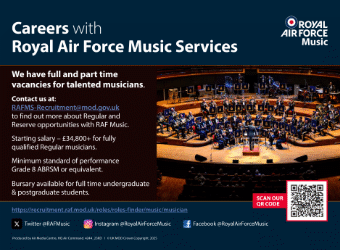Months of rumour came to an end on the weekend in Cheltenham with the announcement made by the Kapitol Promotions National Championships Music Panel of the set-works to be performed at the 2026 Regional Championships of Great Britain.
Unfortunately, any sense of anticipation was rather diluted as the identity of the works were leaked on social media.
Repertoire span
The repertoire covers a span of over 75 years from the pens of Eric Ball, Gordon Langford, Martin Ellerby, Andrew Wainright and Philip Harper.
The inclusion of Eric Ball's 'Indian Summer' has subsequently caused some debate, in part due to the outdated stereotypes referenced in the narrative foreword to the work which were prevalent at its time of original use in 1950.
4BR was informed that these were discussed at length by the panel comprising Artistic Director Dr Robert Childs, Duncan Beckley, Andrea Price, Sandy Smith and John Maines with chairman Philip Morris and Tim Jones as administrator.
Whilst the wider considerations and context of the music were very much appreciated and should be further explained ahead of performances, it was felt that the work also provided in the quality of its craftsmanship the opportunity for bands to compete even with a reduced number of players.
Championship Section:
Elgar Variations (Martin Ellerby)
Written to mark the 150th anniversary of the birth of composer Sir Edward Elgar (1857-1934), the work was first used as the set-test for that 2007 European Championships, followed by major championship events in the UK, USA and Australia.
2026 however will make nearly a decade since it was last performed as a set-test, although it has been utilised as an own-choice piece on numerous occasions.
The composer state that the 'variations' of the title are not constructed on any of Elgar's actual themes, instead being reflective of the essence and character of his musical style.
First Section:
Variations on 'Was Lebet' (Andrew Wainwright)
Based on the German chorale 'Was Lebet' (O worship the Lord in the beauty of holiness), Andrew Wainwrights work, made up of five contrasting variations, was written in 2017.
These include a majestic opening followed by giocoso first variation, a reflective second variant and a quirky, volatile third. There is a romantic feel to the following fourth variation, with a playful waltz whilst variation 5 is fugal in nature, leading to a grand presentation of the original theme.
It was first used a set-work at the Swiss National Championships in 2022 and again at the Dutch National Championships in 2024.
Second Section:
20,000 Leagues under the Sea (Philip Harper)
Written to celebrate the 35th anniversary of the Orchestre de Cuivres Amiens in 2024, Philip Harper's test-piece is inspired by Jules Verne's science fiction novel of the same name, originally serialised between 1869 and 1871.
It tells the story of the adventures of the enigmatic Captain Nemo and his rather reluctant protagonists aboard the submarine 'Nautilus' through five interlinked sections; 'The Nautilus'; 'The Coral Kingdom'; 'Squid Attack'; 'Captain Nemo' and 'Maelstrom'.
The work was first used as a set-test at the French National Championships (Third Division) in 2025.
Third Section:
Three Haworth Impressions (Gordon Langford)
Gordon Langford (1930-2017) enjoyed a long and successful compositional association with the brass band world, although primarily as an exceptional arranger of concert works. He did however produce small selection of original test-pieces, of which 'Three Haworth Impressions' was written in 1979.
The three-movement work is inspired by the Bronte sisters, the celebrated early 19th century novelists who lived for the vast majority of the lives in Haworth in West Yorkshire.
The opening 'Top Withens' captures the dark atmospheric undercurrents found in Emily Bronte's 'Wuthering Heights', whilst the waltz-like 'Three Bells' refers to the pseudonyms adopted by Emily and her sisters Ann and Charlotte.
The final movement 'The Worth Valley Railway' is a celebration of the freedom of travel and exploration for the women that comes to the area with the arrival of the Victorian railway network.
It will be the first time the work has been used as a set-test.
Fourth Section:
Indian Summer (Eric Ball)
Eric Ball (1903-1989) wrote a huge catalogue of original and arranged works for the brass band medium, including test-pieces at all levels.
'Indian Summer' was written in 1950 and first used the Regional Championships of Great Britain in the same years. It has subsequently been revived for competitive use on numerous occasions since, including the Fourth Section Regional Championships in 1999.
It is music of its time, and as a result reflects the limited understanding and depiction of Native American culture — the four movements, 'The Great Chief Speaks'; 'By the Cool Waters'; 'Totem Dance' and 'Hymn to the Great Spirit' derived from a foreword narrative storyline.

















